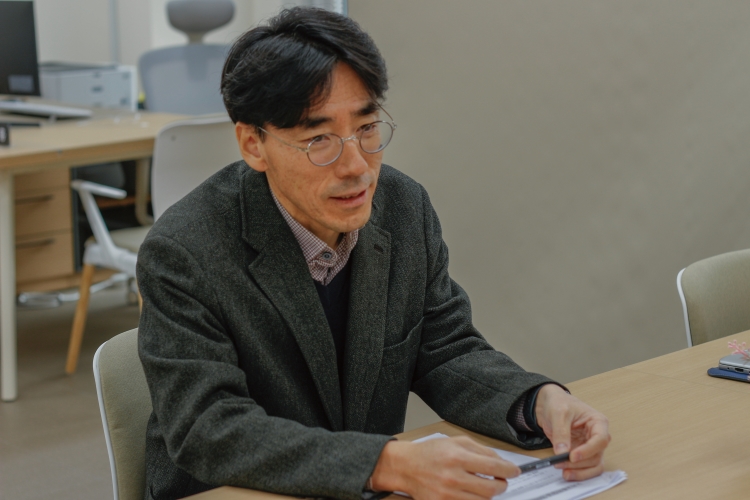
 ▲Jihong Hwang, the Provost for Office of International Affairs
▲Jihong Hwang, the Provost for Office of International Affairs
On December 26, Jihong Hwang was appointed as the Provost for Office of International Affairs (OIA) by the 13th SeoulTech president, Donghwan Kim. The SeoulTech interviewed the newly appointed Provost to talk about his ideas and goals.
Q1. Could you introduce yourself?
A1. Hello. I'm Jihong Hwang and have been working as a professor of Mechanical System Design Engineering since 2007. Recently appointed as the Provost of the OIA, I've just begun my work here. Currently, we are in the process of formulating detailed plans. While I have experience in university system design work, it's my first time serving in the position on SeoulTech campus.
Q2. What is your vision for the future of the OIA?
A2. I pursue 'SeoulTech in the world,' not 'world-famous SeoulTech.' It means making SeoulTech's values, assets, and education accessible to anyone worldwide. For this, I aim to unite international students within a single SeoulTech system. In the long term, the ultimate goal is to reduce and eliminate the need for independent parts solely for international students within the OIA. Instead, it is our goal to embrace international diversity in a unitary system.
Q3. There is feedback that opportunities for interaction between international students and Korean students are limited. Do you have any plans to expand opportunities for international interaction?
A3. I think students might perceive a lack of opportunities because of insufficient promotion of OIA programs. Therefore, we plan to actively promote our programs while developing and enhancing the international programs. However, I believe that improvement in SeoulTech members' openness and campus-wide awareness is needed to ultimately increase interaction between students. It's hard for OIA to support every aspect of international interaction, so students should pay attention and seek opportunities themselves. I believe that enhancing openness and raising awareness can contribute to this. The OIA will also conduct awareness education for professors about students from developing countries in order to create an environment that views all international students not as additional members but as major members of SeoulTech.
Q4. As you are going to lead the OIA with new SeoulTech president Donghwan Kim, we'd like to ask a question about how the OIA will specifically realize his plans. In the last issue of The SeoulTech, president Kim revealed his plan for the expansion of exchange programs. We wonder what direction this has taken.
A4. To make the expansion of the exchange program for SeoulTech students possible, we need to generate demand for international students coming to SeoulTech. This requires each college and department to be prepared to accept international students. That means there should be courses that international students can take. Therefore, in each department, Korean students should consider module lectures conducted in English as a standard expectation and professors should put effort into creating module lectures for students' exchange opportunities. However, the OIA can play a role in creating an effective system for managing module lectures. We will reorganize the system to enhance the quality and efficiency of lectures. Measures we are considering include offering lectures where international students can learn about Korean culture in the International College and abolishing quotas on international students in lectures. Furthermore, lectures not conducted entirely in English within existing module lectures will be adjusted according to the allEnglish rule.
Q5. In the same context as the realization of president Kim's pledge, how does the Korean language program, managed by the OIA, differ from the Global Education Total System of the International College?
A5. Unlike the Global Education Total System, the Korean language program is not designed for a degree but for students who are interested in Korea and want to learn Korean. We'd like to give motivation for enrolling to SeoulTech through the Korean language program. Given the rapid decline in the number of Korean students due to the low birthrate, attracting more international students has become an important matter. To align with these structural changes in society, we will work hard to create a supportive environment, reorganize the system, and offer programs so that diversity can be accepted and respected.
Q6. As the provost of OIA, do you have any last words for international and Korean students?
A6. In a book I read, there was a passage stating that benches where you can see people passing by are more popular than those watching a flower garden. This implies people are not static, continuously change and have various aspects, so they can give us pleasure. Interacting with people who have grown up in totally different cultures is also the same. If you take a deep interest and actively engage, a new world will unfold. I hope that SeoulTech students build rich experiences through these interactions.
Reporter,
Kyungmin Shin
km.pa22@seoultech.ac.kr


 Comment 0
Comment 0 Posts containing profanity or personal attacks will be deleted
Posts containing profanity or personal attacks will be deleted